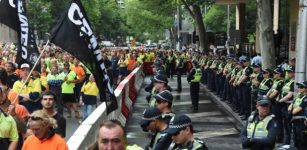Union Leader Encourages Illegal Strikes

The most powerful figure in the Australian union movement has no problem with members breaking “unjust laws” relating to industrial action.
The new secretary of the Australian Council of Trade Unions,Sally McManus, made it clear she supports the decision of the Construction, Forestry, Mining and Energy Union (CMFEU) to engage in illegal strikes.
“It might be illegal industrial action according to our current laws. And the current laws are wrong. It shouldn’t be so hard for workers in our country to take industrial action,” she remarked, adding, “I believe in the rule of law where the law is fair and right but when it’s unjust, I don’t think there’s a problem with breaking it.”
Political Criticism
Tasmanian Liberal senator, Eric Abetz, has criticised Ms McManus, asserting that laws are there to be obeyed regardless of their nature and effect.
“We live in a democracy and in circumstances where democratically elected parliaments pass laws those laws must be obeyed by all – no ifs, no buts”, he said.
Employment Minister Michaelia Cash shares Mr Abetz’s view, describing Ms McManus’ comments as “an extraordinary admission by a newly minted union leader that she believes she is above the law”.
“McManus has tonight belled the cat on the principles of militant unions in Australia: they will obey the law if and when they choose.”
Labor leader Bill Shorten has distanced himself from Ms McManus, saying “If you don’t like a law, if you think a law is unjust, use the democratic process to get it changed”.
“We believe in changing bad laws, not breaking them.”
Current Anti-Strike Laws
Employment lawyer Shae McCrystal explains that existing laws only permit industrial action to be taken:
- With other employees of the same employer for a specific enterprise agreement,
- During a bargaining period after the expiry of an old agreement,
- For rights that can be put into an agreement, not other legal or policy measures – even when they directly affect workers (such as striking against a public-sector pay cap or workers’ compensation cuts),
- For their own rights, not in sympathy with other workers through secondary boycotts, and
- In isolation, not through pattern bargaining to achieve common agreements across multiple employers or supply chains.
The government has also empowered the Fair Work Commission to terminate or suspend industrial action.
Ms McCrystal believes these restrictions contravene the right to freedom of association contained in international labour law.
Silencing Dissent
Existing laws prohibit workers from collectively striking against a range of government policies which directly affect them.
Examples of workers being prevented from engaging in industrial action include:
- Public servants who sought to strike against the NSW 2.5% public-sector pay cap.
- Firefighters who wanted to hold strikes against cuts to their workers compensation benefits.
- Fairfax Media journalists who sought to strike after significant numbers of their colleagues were suddenly made redundant, and
- Builders who sought to implement green bans to stop the development of public historical spaces.
Protecting Big Business
Ms McManus believes it is “totally wrong” that the CFMEU could be fined for holding strikes to protect the lives of its members.
In 2014, Construction company Grocon was ordered to pay $250,000 after a wall on its building site in Melbourne collapsed killing three people.
Grocon pleaded guilty to a breach of workplace safety laws, with Magistrate Charlie Rozencwajg finding that an “extremely large number” of workers were put at risk of serious death or injury as a result of the company’s actions.
Despite the severity of the breach and resulting deaths, CFMEU members were warned against industrial action – regardless of whether it was aimed at ensuring the implementation of better safety measures for workers.
The warning was very real, as the union was previously fined $1.25 million for engaging in industrial action which was designed to highlight the dangers at Grocon sites.
Political Backing for Workers
The Greens have expressed their support for the right of workers to contravene the restrictions contained in the Fair Work Act.
“Of course, we can’t all just pick and choose which laws we want to follow, but our labour laws breach international law and you can’t condemn people who get punished under them,” said Greens industrial relations spokesperson Adam Bandt.
The Greens have echoed Ms McManus’ calls to safeguard the rights of workers to associate, express their concerns and to protest.
But for many, it seems the major parties are more concerned with helping large corporations to maximize their profits than protecting the safety and interests of workers.






